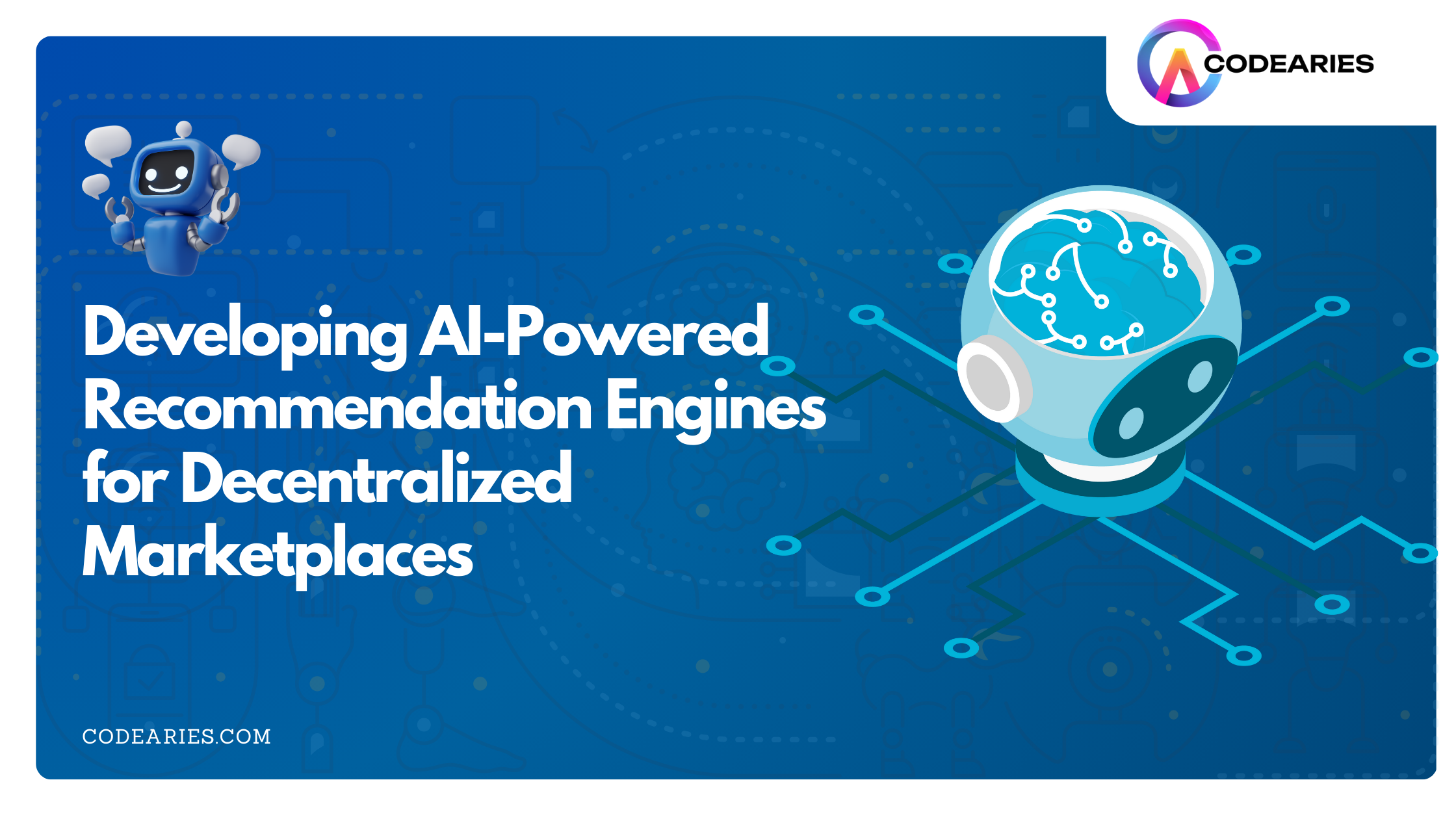
As decentralized technologies continue to gain traction across various sectors, the convergence of artificial intelligence (AI) with blockchain technology has emerged as a powerful combination. Among the numerous applications of blockchain, decentralized marketplaces stand out as platforms where users can engage in transactions directly with one another, bypassing the need for central authorities. While these marketplaces offer unparalleled advantages such as enhanced transparency and user control, they face challenges in delivering the same level of user experience centralized platforms provide. This is where AI-powered recommendation engines come into play, offering solutions that significantly enhance user engagement and satisfaction.
This article delves into the development of AI-powered recommendation engines specifically tailored for decentralized marketplaces, exploring the challenges, solutions, and technologies involved in bringing these systems to life.
Defining Decentralized Marketplaces
Decentralized marketplaces are digital platforms that operate on blockchain technology. They facilitate peer-to-peer transactions without the need for a central governing body. Unlike traditional marketplaces that rely on intermediaries to manage transactions, decentralized platforms leverage smart contracts and distributed networks to automate and secure exchanging goods, services, and information.
Key Features of Decentralized Marketplaces
- User Control: Users maintain complete control over their data and assets, reducing risks associated with centralized control and potential data breaches.
- Transparency: All transactions are recorded on a public ledger (blockchain), ensuring transparency and the ability for anyone to audit them.
- Trustless Environment: Smart contracts eliminate the need for trust between parties, as transactions are automatically executed when predetermined conditions are met.
- Censorship Resistance: Decentralized marketplaces are resistant to censorship since there is no central authority that can restrict or alter transactions.
As decentralized marketplaces grow, the need for advanced tools and systems to enhance user experience and streamline operations becomes increasingly evident. AI-powered recommendation engines are one such tool, offering personalized interactions that make these platforms more accessible and user-friendly.
The Impact of AI on Digital Marketplaces
Artificial intelligence has already significantly impacted traditional digital marketplaces, revolutionizing how products are recommended, services are provided, and customer interactions are managed. AI analyzes consumer preferences based on massive datasets in traditional e-commerce systems, providing tailored recommendations that increase drive sales.In decentralized marketplaces, AI becomes even more crucial. Due to the distributed nature of these platforms, user data is often less centralized, making it challenging to analyze behaviour and provide relevant recommendations. AI-powered systems can overcome these challenges by processing distributed data and making intelligent predictions about user interests, thereby enhancing the overall functionality and appeal of the platform.
Applications of AI in Decentralized Marketplaces:
- Recommendation Engines: AI can analyze user behavior, preferences, and interactions across decentralized platforms to provide personalized products, services, or content recommendations.
- Security Enhancements: AI can detect anomalies and potential security threats, thereby improving the safety of decentralized platforms.
- Automated Customer Support: AI-powered chatbots and virtual assistants can provide 24/7 support to users, helping them navigate decentralized marketplaces efficiently.
- Market Trend Forecasting: AI algorithms can analyze data from decentralized networks to predict market trends, enabling users to make informed decisions.
The Necessity of Recommendation Engines
Recommendation engines are integral to modern digital platforms, assisting users in navigating vast amounts of content, products, or services by offering personalized suggestions based on their preferences and behavior. The global recommendation engine market based on AI, is expected to grow from USD 801.1 Million in 2017 to USD 4414.8 Million by 2022, at a Compound Annual Growth Rate (CAGR) of 40.7% during the forecast period. In decentralized marketplaces, where the user experience can be complex and overwhelming, recommendation engines are essential for several reasons:
- User Engagement: Personalized recommendations keep users engaged by presenting them with relevant options that match their interests, increasing the likelihood of interaction and retention.
- Increased Conversion Rates: By suggesting products or services that align with user preferences, recommendation engines can drive higher conversion rates and increase sales.
- Streamlined Navigation: In marketplaces with a wide range of offerings, recommendation engines help users find what they seek more quickly and efficiently, reducing friction and improving the overall user experience.
- Competitive Advantage: Platforms with advanced recommendation systems can differentiate themselves from competitors by offering a more tailored and user-friendly experience.
AI-Driven Solutions for Decentralized Platforms
Despite the challenges, AI offers robust solutions for decentralized marketplaces, helping to enhance user experience and platform efficiency. By leveraging machine learning algorithms, blockchain technology, and decentralized data processing techniques, developers can create recommendation engines that are both effective and aligned with the decentralized ethos.
Decentralized Data Processing
One of the main challenges in decentralized marketplaces is the fragmented nature of user data. AI models can be designed to process data locally on user devices using techniques like federated learning. This approach allows the recommendation engine to learn from user behavior without requiring centralized data storage, preserving user privacy while providing personalized recommendations.
Blockchain Integration
Integrating AI with blockchain technology can enhance the transparency and trustworthiness of recommendation engines. Smart contracts can automate the recommendation process, ensuring that all transactions are verifiable and recorded on the blockchain. Additionally, blockchain can create a reward system for users who contribute data to the platform, incentivizing participation and sharing.
Hybrid AI Models
To overcome scalability issues, hybrid models that combine decentralized and centralized components can be employed. For instance, critical data processing tasks can be handled by centralized servers while the results are distributed across the decentralized network. This approach balances the need for efficiency with the principles of decentralization.
Data Handling in Decentralized Marketplaces
Data collection is a critical component of any AI-powered recommendation engine. However, in decentralized marketplaces, traditional data collection methods are often impractical due to the distributed nature of the platform. Developers can use innovative techniques to address this challenge:
Federated Learning
In federated learning, AI models are trained on user data across multiple decentralized devices without transferring the data to a central server. This method allows the recommendation engine to learn from user behavior while maintaining data privacy.
Encrypted Data Sharing
Users can share encrypted data with the recommendation engine, ensuring their personal information remains secure. This approach allows the AI to analyze the data without compromising user privacy.
On-Chain Data Analysis
Blockchain technology can store and analyze data directly on the blockchain. This method ensures that all data processing is transparent and immutable, aligning with the principles of decentralized marketplaces.
AI and Personalization in Decentralized Marketplaces
Personalization is one of the critical advantages of AI-powered recommendation engines. These engines can provide highly customized suggestions that improve user experience in decentralized marketplaces by examining user behavior and preferences.
- Behavioral Analysis: AI can analyze a user’s past behavior, such as browsing history, purchases, and interactions with other users, to predict what they might be interested in following.
- Contextual Recommendations: In decentralized marketplaces, where the context of a transaction can vary widely, AI can use contextual data—such as the time of day, location, or current trends—to provide more relevant recommendations.
- Dynamic Personalization: As users interact with the marketplace, the AI system can continuously update its recommendations in real time, ensuring they remain relevant and engaging.
Machine Learning Algorithms for AI Systems
Developing an effective recommendation engine for decentralized marketplaces requires selecting the suitablemachine learning algorithms. Some of the most commonly used algorithms include:
- K-Nearest Neighbors (KNN): KNN is a simple yet effective algorithm for making recommendations based on the similarity between users or items. It is instrumental in decentralized environments where data may be sparse.
- Singular Value Decomposition (SVD): SVD is a matrix factorization technique widely used in recommendation systems. It can handle large datasets and is effective in making personalized recommendations.
- Deep Learning: Deep learning algorithms, such as neural networks, can analyze complex patterns in user behavior to make highly accurate recommendations. These algorithms are instrumental in decentralized marketplaces with large amounts of data.
Case Studies: AI in Decentralized Marketplaces
Several decentralized marketplaces have already begun integrating AI-powered recommendation engines into their platforms. These case studies highlight AI’s potential to enhance user experience and drive engagement in decentralized environments.
OpenBazaar
OpenBazaar is a decentralized marketplace that allows users to buy and sell goods directly with one another. By integrating an AI-powered recommendation engine, OpenBazaar can provide personalized product suggestions based on user behavior, increasing engagement and sales.
Origin Protocol
Origin Protocol is a decentralized platform for creating peer-to-peer marketplaces. The platform uses AI to analyze user data and make personalized recommendations, helping users find relevant products and services quickly.
SingularityNET
SingularityNET is a decentralized marketplace for AI services. The platform leverages blockchain and AI to create a transparent and secure environment for buying and selling AI algorithms and services. The recommendation engine on SingularityNET uses AI to match users with the most relevant services, enhancing the overall user experience.
How can Codearies help you?
At Codearies, we leverage cutting-edge technology to elevate your digital presence and drive your business forward. Whether you’re looking to develop a high-performing website or a sophisticated mobile app, our team combines expertise in modern development frameworks with a focus on security and user experience. We also offer ongoing support and maintenance to ensure your digital assets remain current and functional. Beyond development, our digital marketing and SEO services help boost your online visibility and attract targeted traffic. With a keen eye for UI/UX design, we craft engaging and intuitive interfaces that enhance user satisfaction and drive conversion. Consult us now!
Conclusion
AI-powered recommendation engines can revolutionize decentralized marketplaces. They offer personalized and engaging user experiences. These systems uphold decentralization principles. By integrating AI, marketplaces enhance user satisfaction while preserving data control. Developers can create effective recommendation engines that align with decentralized platforms’ unique challenges by leveraging advanced machine learning algorithms, blockchain technology, and decentralized data processing techniques.
As decentralized marketplaces gain popularity, the creation of AI-powered tools will ensure that they can rival their centralized counterparts. Decentralized markets may provide customers with customized experiences and total control over their assets and data by leveraging AI.
FAQS
What are AI algorithms for recommendation systems?
- Content-Based Filtering: Suggests items similar to those a user likes based on item features.
- Collaborative Filtering: Recommends items based on preferences of similar users or similar items.
- Matrix Factorization: Uses latent factors from user-item interactions for recommendations.
- Deep Learning: Utilizes neural networks to identify complex patterns in user behavior.
- Hybrid Models: Combines multiple techniques to improve recommendation accuracy.
What is the best model for recommender systems?
Hybrid models are often considered the best as they integrate various recommendation techniques to enhance accuracy and relevance.
What is decentralized computing for AI?
Decentralized computing distributes AI tasks across multiple nodes. Essential methods include federated learning, edge computing, and blockchain integration.
What are AI marketplaces?
AI marketplaces are platforms for buying and selling AI models and services, such as SingularityNET and Algorithmia.


